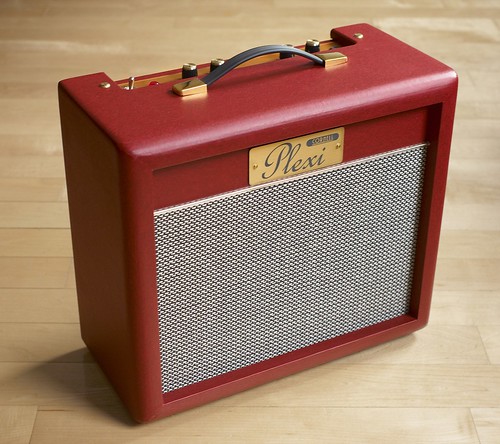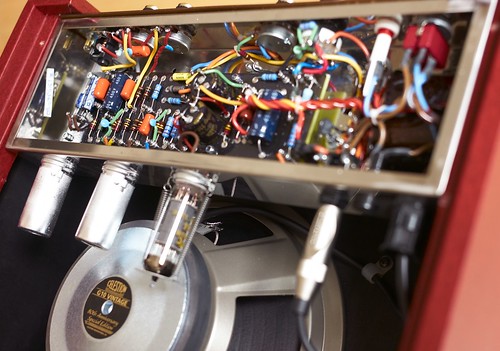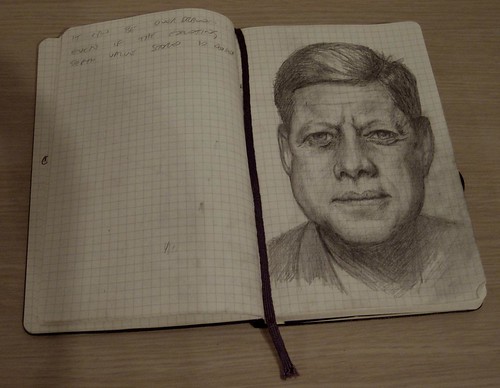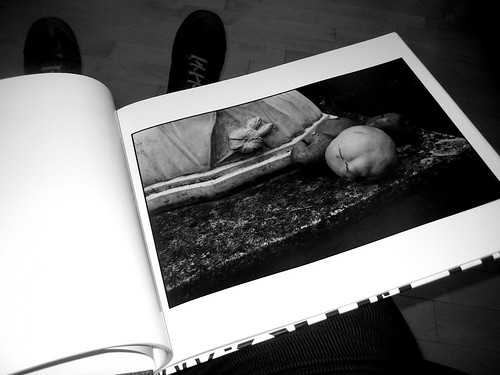Have You Ever Been to Electric Ladyland?
A couple of months ago I treated myself, as my Hellboy 2 overtime self-present, to a new guitar amp. I sold my last one before moving in with Tinseltroos. It was lovely, but it was also 80 watts which is way too much wallop for domestic use. I had looked high and low for a low-powered (5 watts or so) valve (tube to the American readership) amplifier capable of producing those late 60s Jeff Beck, Robin Trower, Cream, and early Van Halen type sounds at a reasonable volume level. I ended up coming across Denis Cornell's amplifiers. He builds amps for Eric Clapton and Robin Trower so I figured he must know what he was doing. His amps aren't cheap but they aren't insanely expensive either and they are all hand-built with point to point soldering; none of your printed circuit boards here if you please. As part of his non-custom range, Denis Cornell builds a 7 watt Plexi amplifier which seemed perfect. After waiting for about a month the only shop in London to stock Cornell amps got a batch in. The batch of twelve amps arrived on Wednesday, by the time I was able to make it to the shop on Saturday only two remained, one of which was the red 7 watt beauty you see above. I tried it and could almost have wept, here was the fat, edgy tone I'd been trying to recreate for years. So I ponied up the cash and took the amp home.
Tragedy! It was still too loud to use at home, even on its lowest setting I couldn't get it to overdrive without serious volume, in the space of the guitar shop it hadn't seemed so loud but at home, nope it wasn't going to fly. So I jumped on the internet to see what could be done. After searching about for a bit I found that there are some power attenuators manufactured specifically for valve (tube) guitar amps and so here, I thought, I might find salvation. Before I bought one I thought I would just check with the manufacturer of my amp as to the wisdom of adding the attenuator. So I wrote an e-mail to Denis Cornell, expecting a short, formal reply in a week's time. Within the day I'd received a lengthy, very friendly e-mail in which Denis said he thought the attenuator would work, though this wasn't what he had in mind when he designed the amp. Would I, he inquired, be able to travel down to Southend with my amp and he'd see what he could do to lower the volume. This was too good an opportunity to miss and that is how I came to be on the train yesterday morning.
The taxi from Southend station dropped me at the company's address with my amp in one hand, guitar in the other. I was confused. I was standing in a street of detached bungalows, the sort that people retire to. Perhaps I'd made a terrible mistake I thought, perhaps I copied the address down wrong? I knocked on the door. A moment later a smallish grey haired gent, probably in his late fifties answers the door. His glasses are held together with sticky tape. I ask if he's Denis Cornell. He replies in the affirmative and I am invited in. Denis's workshop/tinkering area is what would have been the front bedroom had the building still been a home. Denis sat me down and pottered off in his slippers to make us a cup of tea. Looking around the room was like looking at an electrical engineer's sweet shop. The walls were covered with neat little drawers each with a hand written note behind which could be seen capacitors, resistors, potentiometers and on and on. Leaning against the wall next to the door were a variety of half constructed amps, on the work bench next to me were a variety of soldering irons, oscilloscopes and transformers.
Denis returned and asked me to explain my problem again, then he asked me to play though the amp so he could hear how loud was too loud. I did this. He unscrewed the back of the amp, scratched his chin, removed a couple of components and soldered new ones in their place. I am always impressed by good soldering, mostly because I stink at it. Denis was like the Bernini of hot tin and lead; a beautiful job. We tried the amp again, still a little loud. Another scratch of the chin another couple of components replaced. This time it was great, it was still loud but not too loud. Denis screwed the casing on the back of the amp and then pottered out of the room. He returned a moment later hauling a huge roll of red tolex (fake leather that amp cases are often covered in). "This is what we're going to cover Robin Trower's amp in" he says, "Red and black, with gold piping. Sexy eh?" I had to agree. Denis dragged his Tolex back out of the workshop and returned having, I noticed, swapped his carpet slippers for shoes. "I'll run you back to the station." he said. I could have died. Here was a guy who had not only designed and built an amazing amp, he'd invited me down to modify it to better meet my needs, he'd refused any money for doing the work, and now he was going to take me back to the station. Denis Cornell is a legend. So now I have a custom Cornell Plexi Seven, a host of anecdotes and an overwhelming desire to be evangelical about the man himself as well as his creations.















